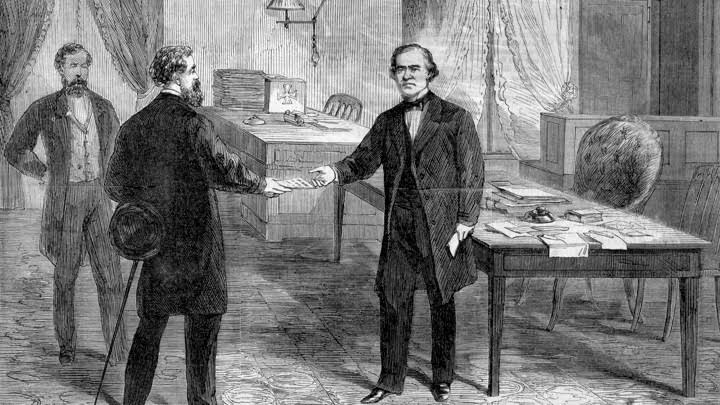The Andrew Johnson impeachment was initiated on February 24, 1868, when the United States House of Representatives resolved to impeach Andrew Johnson, 17th president of the United States, for “high crimes and misdemeanors”, which were detailed in 11 articles of impeachment.
Causes of Andrew Johnson’s Impeachment
In 1867 Congress passed the Tenure of Office Act, and again overrode a presidential veto. The act forbade the president to remove any civil official, including Cabinet members, without the consent of the Senate. It clearly had in mind secretary of war Edwin Stanton, a holdover from Lincoln’s Cabinet who was in danger of being fired by Johnson. Stanton was a Radical Republican and functioned as a White House mole for his Radical allies. He even used the War Department’s telegraph line to censor messages intended for or sent by the president. Thus the Tenure of Office Act was a brilliant Radical stroke: If Johnson abided by it, Stanton was safe; if he defied it, he could be impeached.
Johnson did, in fact, dismiss Stanton. That may seem foolish; did he not see that the Radicals were trying to trap him into doing just that, in order to devise grounds on which to impeach him? Johnson, however, was convinced that he would be vindicated when the constitutionality of the act was reviewed by the Supreme Court. And there was a good reason to believe that he would prevail. In a congressional debate on the matter in June 1789, James Madison had made the argument that the power to remove a Cabinet official rested exclusively with the president, and that it would be unconstitutional for Congress to attempt to interfere with this power. Years later, the Supreme Court finally did vindicate Johnson when Chief Justice William Howard Taft declared in Myers v. the United States (1926) that “the Tenure of Office Act of 1867, in so far as it attempted to prevent the President from removing executive officers who had been appointed by him and with the advice and consent of the Senate, was invalid.” Such vindication came rather too late.
The Radicals believed they had grounds for Andrew Johnson impeachment for violation of the constitutionally dubious Tenure of Office Act. Although they were strong enough by 1867 to override Johnson’s vetoes consistently, they had come to detest him, and moreover, they feared that as the head of the executive branch, which was charged with the responsibility of enforcing the law, Johnson might be lax in enforcing reconstruction legislation that he did not support. They promptly impeached him in the House, but the vote to remove him from office fell one short of the necessary two-thirds. But Johnson had been gravely weakened by the proceedings and by the stigma of being the first president ever to be impeached.
Cite This Article
"Causes of Andrew Johnson’s Impeachment" History on the Net© 2000-2024, Salem Media.
April 27, 2024 <https://www.historyonthenet.com/causes-of-andrew-johnson-impeachment>
More Citation Information.






